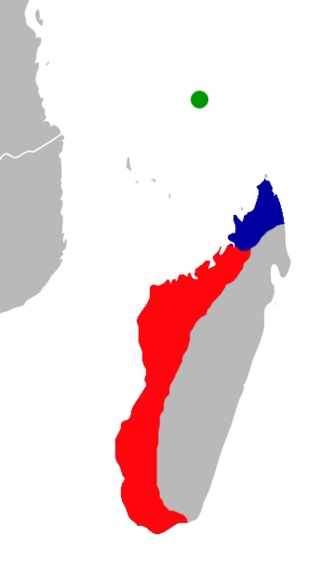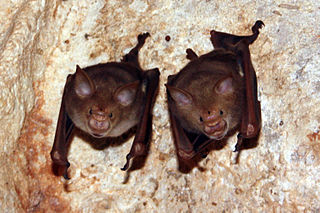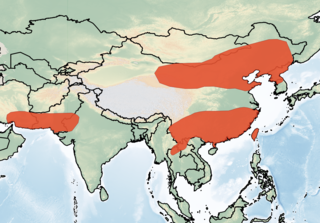
Schlieffen's serotine, also known as Schlieffen's bat or Schlieffen's twilight bat, is a species of vesper bat found in Africa. It has been placed in numerous genera since its first description in 1859, but morphological and genetic studies have confirmed it as the only species in the genus Nycticeinops. It is named for the collector of the original specimen, Wilhelm von Schlieffen-Schlieffiennburg.

Patrizi's trident leaf-nosed bat is a species of bat in the family Hipposideridae. It is found in Eritrea, Ethiopia, and Saudi Arabia. Its natural habitats are subtropical or tropical dry shrubland and caves.

Asellia is a genus of bat in the family Hipposideridae. It contains the following species:

The trident bat or trident leaf-nosed bat is a species of bat in the family Hipposideridae. It is widely distributed in the Middle East, South and Central Asia, and North, East, and Central Africa. Its natural habitats are subtropical or tropical dry forests, dry savanna, subtropical or tropical dry shrubland, caves and hot deserts.

Percival's trident bat is a species of bat in the family Hipposideridae. It is monotypic within the genus Cloeotis. It is found in Sub-Saharan Africa, with its core distribution in Southern Africa. It has been reported from Botswana, Democratic Republic of the Congo, Eswatini, Kenya, Mozambique, South Africa, Tanzania, Zambia, and Zimbabwe. Its natural habitats are savannas where there are suitable caves and mine tunnels that it can use for roosting. Colonies are never large. Local numbers fluctuate greatly. Colonies can disappear, perhaps because they move to another place or go extinct.

Grandidier's trident bat is a species of bat in the family Hipposideridae endemic to Madagascar. It was formerly assigned to the genus Triaenops, but is now placed in the separate genus Paratriaenops.

The Hipposideridae are a family of bats commonly known as the Old World leaf-nosed bats. While it has often been seen as a subfamily, Hipposiderinae, of the family Rhinolophidae, it is now more generally classified as its own family. Nevertheless, it is most closely related to Rhinolophidae within the suborder Yinpterochiroptera.

Triaenops menamena is a bat in the genus Triaenops found on Madagascar, mainly in the drier regions. It was known as Triaenops rufus until 2009, when it was discovered that that name had been incorrectly applied to the species. Triaenops rufus is a synonym of Triaenops persicus, a Middle Eastern species closely related to T. menamena— the Malagasy species had previously been placed as a subspecies of T. persicus by some authors. Triaenops menamena is mostly found in forests, but also occurs in other habitats. It often roosts in large colonies and eats insects such as butterflies and moths. Because of its wide range, common occurrence, and tolerance of habitat degradation, it is not considered to be threatened.
The Turkestani long-eared bat is a species of bat found in Asia. Though it was initially described in 1873 as a species, for many years it was considered synonymous with the desert long-eared bat, Otonycteris hemprichii. Recently, it was recognized as a distinct species once again.

The African trident bat is a species of bat found in Africa.
The Yemeni trident leaf-nosed bat is a species of bat found in the Middle East.

The Arabian trident bat is a species of Old World leaf-nosed bat found in the Middle East.
The Egyptian mouse-tailed bat is a species of mouse-tailed bat found in North Africa and the Middle East.

The Oriental serotine is a species of bat in the family Vespertilionidae. It is widespread and found throughout Asia.










